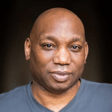Become a Creator today!Start creating today - Share your story with the world!
Start for free
00:00:00
00:00:01

Episode 430: Louisa Thomas Knows How to End a Story
Louisa Thomas is a staff writer for The New Yorker and the author Louisa: The Extraordinary Life of Mrs. Adams and Mind and Matter.
We talk about a profile she wrote on Nikola Jokic as well as her incredible knack for a great kicker.
Newsletter: Rage Against the Algorithm
Show notes: brendanomeara.com
Support: Patreon.com/cnfpod
Transcript
Podcast Openings: Are We On?
00:00:00
Speaker
Don't you hate it when you have to yawn and you can't get it up? Okay, at least if I start the show with a house advert, like, I don't know, editorial services, it kind of is a soft entry into the show. Don't you feel that it can be a jarring experience if a podcast just starts? Are we starting right now? Is this the soft open, the cold open? When will you get this right, B.O.?
00:00:24
Speaker
um so I hate running kickers. I often file actually with like a kick with the phrase in all caps, kicker TK.
Introduction: Brendan and Louisa Thomas
00:00:38
Speaker
um Oh hey CN efforts, this is the Creative Nonfiction Podcast, a show where I speak to badass people about the craft of telling true stories. I'm Brendan O'Meara. You even lived, bro. Louisa Thomas. Comes back to the program. Episode 430. We recorded this months and months ago. It's kind of a theme of late, and it's ah it's a little shorty.
00:01:01
Speaker
She had a profile of Nikola Jokic, perhaps the best basketball player in the NBA, NBA champion for the Denver Nuggets. This feature came out in the New Yorker in the spring ahead of the and NBA playoffs long time ago now. So we talk a little bit about that, but also my fascination with how she ends a story or ends a column. She's really, really good at it.
00:01:29
Speaker
I will add that, for whatever reason, Louisa's audio came in like unusually soft. I bumped it up as high as I could in post, but it's still pretty low. I almost killed this episode altogether because of it. There's still time, B.O. No, there isn't. We're in it.
00:01:45
Speaker
So you might just have to punch it up a bit. Punch up that volume when she's speaking and maybe dial me down a little bit. It's gonna take some toggling for you, okay? it's It's a shorty of a podcast, so it shouldn't be too annoying. If it is, your regularly scheduled audio levels will be back.
Why Subscribe? Importance of Auto-Downloads
00:02:04
Speaker
Next week, show notes to this episode or more or at Brendan of Merit.com, hey where you'll find some new blog posts. It's kind of my internet garden, if you will. You can also subscribe to The Monthly Rage. You can see algorithm newsletter, book recommendations, cool links, good vibes. First of the month, no spam. As far as I can tell, you can't beat it.
00:02:24
Speaker
You know what? And while you're at it, go to your favorite podcast app and smash that subscribe button. It costs you nothing. Maybe even have it auto-download so you can take the show on the go. What a world we live in.
Louisa's Journey: Writing and Teaching
00:02:37
Speaker
Louisa is one of my favorite writers. She's, a anytime I go to New Yorker dot.com and I see her byline for a sporting scene, I'm like, okay, stop whatever. Stop the presses.
00:02:50
Speaker
Time to read Louisa's column. She has a smooth way of moving on the page. She's a staff writer for The New Yorker and an instructor at NYU. She's the author of Louisa, The Extraordinary Life of Mrs. Adams and Mind and Matter, A Life in Math and Football. And the co-editor of Losers, Dispatches from the Other Side of the Scoreboard, which she co-edited with Mary Pallone. She's an avid runner, chess enthusiast, come on, now she's just showing off.
00:03:21
Speaker
tennis player. Is there nothing she can't do? She's wicked smart and here she is. Turn up the volume CNFers riff.
Writing Analysis: Like Studying Film
00:03:43
Speaker
You know, it's great to have the opportunity to engage with some great pieces of writing and pull them apart and put them back together. I mean, a lot ah lot of what you do on this podcast I have to do every week now as ah as a teacher. um So that has absolutely been a gift. And that's not actually something that a writer um has the opportunity to do and a in a sort of structure and systematic way. I mean, I think um all writers probably have pieces, touchstones that they return to and probe and things like that. but
00:04:23
Speaker
But that's sort of like, you know, I think of about athlete like training, you know, it's nice to get a training bucket. Yeah, I think that's been, that's been great. And also just to think about the kind of constituent parts of a piece and what makes it work and some of the stylistic things. It's been fun.
00:04:42
Speaker
Yeah, and of late I've been ah talking to a lot of people and is it about this notion of of film study. And even the best athletes, the the most elite athletes, are ah they are looking and breaking down tape and defenses and they all all this ah all this kind of stuff. And I think similarly that's a applied to to writing, no matter how good you are or how whimsical or how pyrotechnic your prose might be, you still have to kind of study and break down pieces of writing that really hum and you're like, what's making this work? And what does that degree of film study look like for you?
00:05:25
Speaker
not even the best athletes, I would say, especially the best athletes. And I think that actually it's probably something I haven't done enough throughout my career. So this is nice that I have to do it because I think when you're a writer, you get you know you have your reading and things you love, but you get caught up very much in your own work. And when you read, it's sort of more for for for the pleasure than the plumbing. So it's good to sort of actually treat it as a Yeah, it's a kind of education, but I've slipped away from your question. And so you're asking me, what does it look like? the yeah Yeah, the the nature of of your study, you know, for me, just to give you a little just to put it on a tee, so to speak, sometimes I'll take a highlighter and, you know, for instance, e.g.,
00:06:13
Speaker
yeah You know your yokich profile, you know, I took a highlighter and found where where are the scenes at and you know Just highlighting those out and then you start to see the color breakdown of like Oh, here's where exposition is versus the kinetics of a scene and you know That's how I like to do it with my marginalia and color coding of things But you know other people have different methods and I wonder, you know, maybe what yours looks like Sure, I mean I i use a ah pen and underline but I actually don't do I certainly encourage my students to do more of that than I do it myself. When I do it, I largely just read and then reflect at the end, like how did that work or, you know, look for a motif. You know, you know there's some kind of like basic things like what's the kicker, what's the lead, you know, and how does it operate and what are certain kind of themes that, you know, and how do they sort of draw. I'm also always interested in probably more than most people.
00:07:10
Speaker
and you know questions of rhythm and mood and and where those and those sort of manipulations. I tend to a lot of that probably more than structure than a lot of people. I think a lot of people, you know it's like structure, structure, structure. um And I think that's really important and I'm probably
00:07:33
Speaker
could stand to do more of that kind of picking apart, you know, structure. But um but i I think a piece tends to operate, language tends to operate on all these different levels. And I'm sort of, I like to map those things. And so I'm often, you know, alive to certain phrasing or rhythm or kind of like sentence structure or strategies as opposed to just, you know, strategies.
00:08:00
Speaker
the whole piece. And one of the reasons I like actually the the classroom environment is that a lot of that kind of revelation for me comes out in discussion. You know, it's sort of fun to sort of ask a question and then answer it, not just to sort of do it on your own in the margin. That's ideal, but I like the collaborative aspect of those conversations and and you you see things, you know, through other people's eyes and even even if they are pre-med students who are 19 years old, who've never been in a you know workshop setting, um everybody has something to bring to it.
00:08:34
Speaker
yeah And ah one of the most absurd things that that happened recently in the sports journalism landscape, I'm blanking on the the athlete's name, but you know he, well, as has been a trend of late, I recorded this interview several months ago, and this thing that I'm bringing up is old news, but it's germane somewhat.
NBA and Podcast Subscriptions: The Patrick Beverly Story
00:08:57
Speaker
ah The athlete's name is Patrick Beverly, an NBA player. And when an ESPN producer approached him after a game and wanted to ask him a question, he would only take questions from people who subscribed to his podcast. So that's the context of this question.
00:09:17
Speaker
you know He particularly took a fence to an ESPN producer putting a microphone in his face. and like In order for her to ask a question of him, he was like, do you subscribe to my podcast? And I was like, what the fuck is happening here? like This is ah absurd that that would even be on the table, that he's only going to answer questions based on if you're a subscriber to his podcast. It's just absurd.
00:09:45
Speaker
um yeah know i mean it's ah you know it's There's a little bit of a slippery slope situation because there is a lot of access trading for interviews and things like that.
00:09:57
Speaker
um that happens in sports probably as much as politics and any kind of closed world in which access matters, you know, and it kind of indicates, you know, there is some of that stuff that happens, you know, people trade kind of, yeah, access for favorable coverage and favorable, you know, podcast habits, I guess. um But yeah, of course, and and and and and clearly that was seen as out of line, you know, that the team apologized,
00:10:24
Speaker
producer and the NBA, I think, made it clear that that was clearly out of bounds. You know, so I think that there was like pretty, pretty unanimous condemnation of that. It was it was absurd. But there is a kind of, I mean, that also speaks to this like larger us versus them, you know, kind of sense of that happens in in sports where the media is a little bit seen as adversarial or there's no obligation to engage and almost there's something in it for them.
00:10:50
Speaker
Yeah, and a moment ago you were talking about um sentences and even, you know, bringing kickers into it and, you know, talking to your students about kickers and so forth.
Crafting Endings: Louisa's Approach
00:10:59
Speaker
And ah there was something um ah striking that I love about how you end a piece, but be it a column or a profile. And a lot of your final sentences at least in the survey I've done and have just come to expect from you when i when I hit the end of one of your pieces, is it's extremely punchy, often fewer than eight words. It's usually like a five-word sentence. I love it, like with the women's basketball column you wrote recently, you know, the final sentence was like, it was it was fun to watch. Jokic, afterward Jokic just declined to speak. Mookie Betts, it's just me too.
00:11:35
Speaker
ah the recent A's column, you know he eventually dies of neglect. Now that those are without con ah context, but you know you go for a punchy sentence at the end and I always appreciate that. So how cognizant or are you of that degree of finality in your pieces?
00:11:53
Speaker
Um, so I hate running kickers. I own often file actually with bikes. I kick the with the phrase and all caps, kicker TK kicker to come because I find them quite difficult and we sort of.
00:12:05
Speaker
they often come in very late, you know, come to either come to me or my editor is really good at tickers, which is one of the reasons I rely on him when I send things in. For instance, that AIDS column from last weekend, I'd actually begun the second section with the metamorphosis. Actually, I actually tried writing that piece as a parody of the metamorphosis.
00:12:31
Speaker
like full I did the full thing I mean I actually was like mad libs and I had a lot of fun with it and then I gave it to a friend and my friend was like well if you were able to you know run this alongside the metamorphosis it would make sense but no you can't do this so then I turned it into something much more conventional And I had that actually higher up. and And I don't remember what my original kicker was. um But my editor was the one who identified that as the correct way to end the piece. And he was right. So so all credit to him. And and often, like you know he deserves a lot of credit, I think, for we go back and forth on kickers a lot. So I feel like that's actually something he's very good at. And i you know I'm learning from him.
00:13:16
Speaker
But yeah, a pun like short punch of thundness is often, yeah, it is where I want to land, because you want to come away with a bit of a punch, you know kind of like the reverberations of that. So so that's definitely what you what I'm looking for. I do think the kickers are really important, you know and you know especially in a short piece, because at the end of a long piece, you know you sort of trust and they can be magical. I mean, just can totally reframe the whole thing for you, um but also,
00:13:46
Speaker
at the end of a short piece, you can actually trust that they're probably going to get there. So it's really important. Yeah. And ah also, you know, talking about endings there, um how would you process your your way into a piece, be it a column or or a profile, you know those entry points?
00:14:05
Speaker
a column and a profile of different entry points often. Yeah. But in a column, well, these days, i'm i'm I have a ah weekly column. So i have it's all done in a very compressed timeframe. I actually am not writing this week.
00:14:20
Speaker
um but this is the first week I've been written since February, I think. So my entry point to a column is often my deadline. You just have to figure it out in a certain amount of time and then whatever it's going to be, it's going to be, you know, it's sometimes, like I said, sometimes if you're struggling, like you just have to try to have fun with it, like ah like the A's piece. I sort of thought that was going to be just easy, low hanging fruit, to be honest. And i um the backstory is also like I you know my sister was getting married so I was going to DC for a wedding and I wanted to be like very much present you know as a the matron of water and all the her sister and all that stuff so I wanted something that was sort of able I was able to do um that wasn't going to give me too many fits but um but it did actually because everything gives me fits and so and I couldn't sort of figure out a way to be um original
00:15:12
Speaker
And in the end, I'm not sure I was particularly original, but I just wasn't having enough fun with it, because it's such a crazy story. i That's how I i was just kept thinking about this ah story. you know I kept thinking about the stadium. I mean, actually, the you know what it's saying, the piece is true. you know that that stadium reminded me of ah this insect, you know, the opening of the metamorphosis. And I thought, well, there was something very kind of like and sometimes with my friends, I almost like write fan fiction, you know, about athletes. And so I just sort of playing around with that. And then I wrote this whole like 2000 word thing. um And that was a lot of fun. And it ended up not working. But but that was my way into it. You know, that was my process. And then I was able to sort of settle down and use a lot of the material that I had.
00:15:59
Speaker
in that, you know, piece and turn it into something like readable and understandable by people who are not, you know, scanning line by line. And sometimes it's more like I have an idea and I need to, you know, think about what's the lead, you know, and that was the way into it and how does it develop? I don't write an outline. I sometimes usually write a few notes. I have like a, you know, I use Evernote. and So I have a document of full of research or ideas or thoughts or interviews if I've done interviews.
00:16:30
Speaker
And then I just start writing, you know, for a profile, I do kind of block it out a little bit more. I still don't have an in outline, but I have a sort of like a beats I want to hit and general sense of structure. But the main like thing I do for my process is I do a lot of it in my head.
00:16:50
Speaker
I mean, what's sort of unusual, I guess, is that I do a lot of the planning and even pre-writing in my head. right um You actually won't find it in my notes because it's in my head. And I like working in that way because i be I'm a just attendant to feelings and sounds more when it's in my head than when it's on the page. you know And it's easier to sort of say stop and say, well, what what are you trying to get what are you trying to do here?
00:17:15
Speaker
Whereas when it's on the page, you know, I start fiddling with the sentences and things like that and I can get distracted by, you know, I tend to put, when I'm just writing on the page, ah you know, I focus on the information less than the effects So when it's in my head, I'm more focused on the effects probably. So yeah, so my process is very mental.
00:17:39
Speaker
i I like to, you know, I used to, I actually used to always do this and now I don't so much because I have kids and so I have less time. But I used to like to go for a run and like think through a piece. Now I do more of that process when I'm like in carpool line or, you know, like waiting for the water to boil while I'm making pasta.
00:18:03
Speaker
but But I still try to make sure that gets done, that I like actually spend a lot of time just thinking and not just like writing. That's the most important time to me. Oh, for sure. Yeah, and with ah the Jokic profile, what ah you know every piece begins anew.
Writing Nikola Jokic's Profile: Challenges and Insights
00:18:20
Speaker
And ah what ah speaking of this one in particular, what were some things that were just a repartorial challenge for you as you were looking to synthesize the material?
00:18:31
Speaker
Well, I knew I wasn't going to get access to him, so that kind of made that part of it easy. I mean, there are challenges to not getting access, obviously. I went to Dallas, so I had, I knew that I was going to have some of that, like that was going to make its way into the piece. You know what I kind of observed there, at least some of it was going to. And I, you know, we spent some time thinking about like, well, what can we add here? And part of this conversation was like, how does he fit into the What, what are good comps because he's so weird so we were trying to, you know, and and those are partly just like born out of conversations you have with people. um And so there's, I knew I want to section on that. um And then, you know, there becomes this question of like well how can you just build them into the piece and so
00:19:16
Speaker
the conversation I had with Walton, you know, for instance, he was open to watching some of the game with me. So that that actually made its way as like a scene as opposed to just, you know, Bill Walton said he doesn't remind himself or whatever.
00:19:32
Speaker
Yeah, I knew I wanted to begin with Yogech winning the championship because I just, I mean, I just like, I remember watching in real time all the press conference and the, you know, the end of the game and just like, it just seemed so funny and revealing and like so much of what made Yogech Yogech, but also more, you know, more complex than people kind of give him credit for.
00:19:56
Speaker
and I had a pretty strong sense that that's how I wanted it to begin and then a lot of it was also just like trying to really learn about this person that is not that overexposed in some sense for ah all sorts of reasons but you also don't want to just kind of skate along you know what's been said before so it was fun I also just wanted to communicate to this question like what do I do when I'm not writing you know when I'm not on my computer I do try to like As I said, I tried to be like, well, what what am why am I doing? Why am I writing this? And so I spent a lot of time kind of trying try to answer that question. Like a lot of why I wanted to write about Yokich was I loved watching him play. Like it was just so weird and fun and beautiful and funny. And I wanted that experience to like come through in the piece. That was my main goal probably. And I wanted some of that intro, my own interest. I wanted you to feel in the piece, my own interest in watching.
00:20:54
Speaker
and in his like life and and that was my main, yeah, that was my main goal and I i hope it came through. Dang, I wanted you just to like be along let's the me.
00:21:09
Speaker
Yeah, very nice. well it Well, Louisa, I want to be mindful of your time and everything. And and as i of late as I bring these conversations down for a landing, I love asking the guests and writers for recommendations of some kind for the listeners out there. And that can just be you know anything you're excited about. thats but And it could be could be a book, but it could be just like a brand of coffee. You're like, this is good. So i I would just extend that to you as we bring our conversation down for a landing. Let's see. um Good, I mean, I read a lot of good books, books that I love, what are but are recent books that I love. I've been reading a lot of Roger Angel lately, actually. Oh, nice. Because I couldn't find some of mine. So I actually just bought like all of his books and have them by my desk. I mean, I read a lot for for fun. I read like novels and fiction. I'm reading Alice Monroe's collection.
00:22:02
Speaker
I have something to tell you right now in light after her death, I picked it up. you know so and And I care about those books for all this. I have something to say, I guess. And I care of ive something I've been meaning to tell you. That's rhythm and character and you know the beats of a story. that That's the kind of stuff I always, you can get that from anywhere.
00:22:25
Speaker
cool fantastic well luisa thing i think is a much recovered some time in talking a little shop and uh... yet so uh... i i look forward to when we're able to do this again but this is wonderful all right yes awesome
00:22:44
Speaker
door Thanks to Louisa for coming back on the show. Third trip, I believe. Make sure you're subscribing to the podcast. Smash that button and the weekly Rage Against the Algorithm newsletter. Waiting on a final batch of edits, chapter 16 in epilogue. And I've gone through everything to date. I have to go back through in further format and notes and kind of fact check myself. and Maybe work up the courage to call some more people for fact checky purposes or or not. I don't know. I don't know. I don't know what I'm doing anymore. Think of addressed most of the most of the
Handling Criticism: Brendan's Coaching Analogy
00:23:25
Speaker
notes so far. yeah one ah What ends up happening when I get a let's say a new batch of notes?
00:23:30
Speaker
is I mainline them. I just, I scroll through the whole file, and and then I hit a comment, and they are universally bad. And by bad, I mean it's just a shortcoming in the manuscript that I have to address, lest the book get shredded by an astute reviewer. I picture Catherine Schultz of The New Yorker getting a hold of this book and crushing it. Like not in a good way, just like crushing it.
00:23:58
Speaker
But what ends up happening is you mainline enough of the criticism, and it's not like unlike ah eating an entire family-sized bag of sweet chili Doritos. yeah You feel like shit afterwards. You're like, fuck, I'm terrible at this, and nobody will read this, and Catherine Schultz is gonna crush it. Then I go for a 15-minute walk out in the neighborhood, a little three-quarter mile loop, something I like to do every 60 to 90 minutes anyway.
00:24:26
Speaker
and then I return and address the the first comment as best I can. But what's happening is the only notes I get are from like the weak and shitty parts that that need help. There are no notes of for what's good. There's no, oh, I really like what you did here, or this is a really cracking sentence. There's none of that. So in rare moments of confidence and assuredness, I remind myself, okay, if there are no notes, the assumption is that it's good. The quote, bad notes, are they're there to level up to the rest. At least that's the hope.
00:25:03
Speaker
At some point, you realize you're better off with a coach and not a cheerleader. you know What my brilliant, kind, and generous editor is doing is breaking out the game tape, hit and play, pause, rewind, play, pause, rewind, and saying, OK, if we're going to win, we need to make these adjustments. We need to fix this. Otherwise, we're going to get shredded by Catherine Schultz. Bill Belichick.
00:25:28
Speaker
almost never complimented Tom Brady. I'm not saying that's the right thing to do. I think at some point or another, you do need, you need to be like, okay, you know, you're doing a good job here. Here's a, here's a pat on the ass. Those two, they, they established that coaching was better than cheerleading to where they wanted to go. I've chosen to view the criticism through that rubric, you know, no notes means we're not taking on negative plays. We're making progress.
00:25:55
Speaker
He probably really likes everything he's reading where he's not making a note. Notes aren't there to make me feel like shit. It's to make a possibly good book great. And that's that's how you have to, that's how I have to try to reframe it in my head. No notes means we're good. A note here is a chance to level up, a chance to improve. So stay wild seeing efforts. And if you can't do interview, see ya.



















